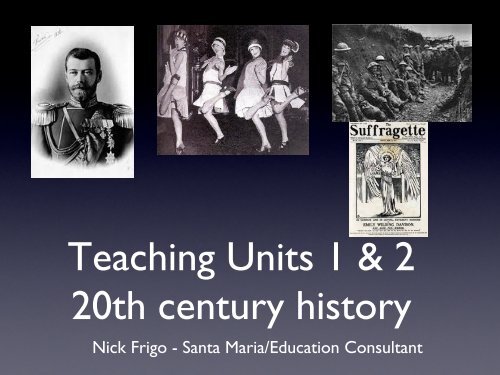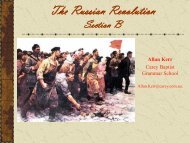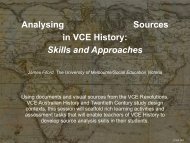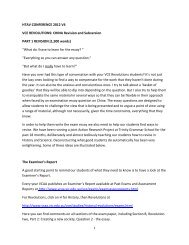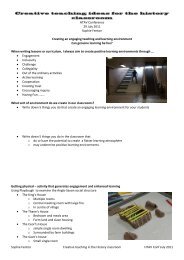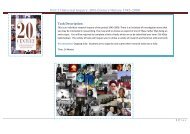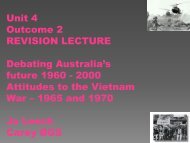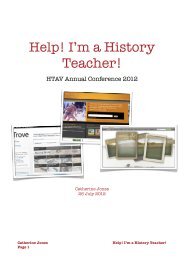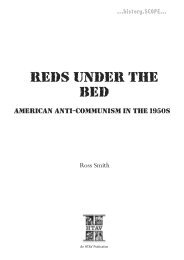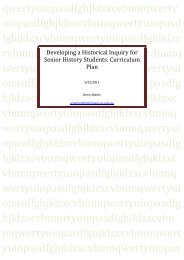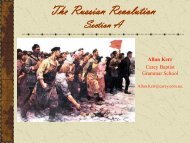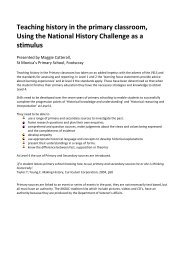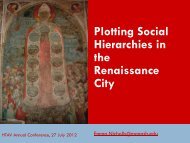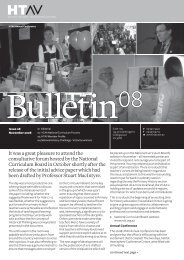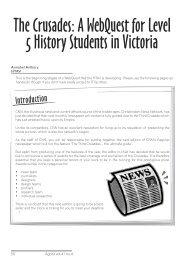20th Century History_NFrigo - HTAV
20th Century History_NFrigo - HTAV
20th Century History_NFrigo - HTAV
You also want an ePaper? Increase the reach of your titles
YUMPU automatically turns print PDFs into web optimized ePapers that Google loves.
Teaching Units 1 & 2<br />
<strong>20th</strong> century history <br />
Nick Frigo - Santa Maria/Education Consultant
An overview of the course:<br />
brief content and skills<br />
key resources to use<br />
how to approach<br />
the assessment tasks
Planning Units - the<br />
study design.
Planning units - your interests,<br />
student background and your<br />
strengths
Immersing students in<br />
the <strong>20th</strong> century <br />
<strong>History</strong> of the century in 100 objects
The flexibility of<br />
teaching Units 1 & 2 -<br />
<strong>20th</strong> century history <br />
No external exam . . . . . . . . . . . . .
Crisis and Conflict <br />
Unit 1 - 1900-1945* <br />
The Russian Revolution
crisis and conflict <br />
communism <br />
Key historical terms <br />
socialism <br />
fascism <br />
internationalism <br />
diplomacy <br />
treaties <br />
propaganda <br />
nationalism <br />
imperialism
Russian Revolution<br />
Sample SAC
The Zeitgeist -<br />
Weimar Germany <br />
Social Life <br />
Unit 1 - 1900-1945*
social life <br />
great depression <br />
colonialism <br />
race <br />
ethnicity <br />
Key historical terms <br />
gender <br />
warfare <br />
invasion <br />
class <br />
age <br />
nationality <br />
industrialisation
Hyper Inflation Task
Weimar Germany -<br />
The Zeitgeist
Cultural Expression <br />
Unit 1 - 1900-1945* <br />
Hitler’s Germany
Now able to make<br />
more selective use of<br />
video*
cultural expression <br />
communism <br />
fascism <br />
dictators <br />
creative expression <br />
avant-garde <br />
Key historical terms
Teacher Applications<br />
for Learning - QR<br />
Code Reader <br />
• Great for creating virtual history trails <br />
• Links to websites, documents, videos <br />
• Time saving, you know the links <br />
• Easy to create, a few clicks and a print out <br />
• Introduce an element of mystery and fun to your school<br />
community <br />
• Great for departmental brochures and subject promotion
Hitlers Germany<br />
Investigation Task
Hitlers Germany<br />
Sample SAC
The Cold War <br />
Ideas and Political<br />
Power <br />
Unit 2 - 1945-2000*
Key historical terms <br />
ideas and political<br />
powernationalismconfl<br />
capitalismcommunism<br />
stwarimperialismethnici<br />
ropagandaisolationism<br />
perpowersideology
Cold War e-Book
eBook <br />
• an electronic version of a student textbook <br />
• It can be a commercially purchased product e.g. Humanities<br />
Alive in an electronic format rather than paper <br />
• It can also be a collection of resources compiled by teaching<br />
staff. <br />
• Each of these types has benefits.
Teacher Created<br />
FOR <br />
eBook <br />
AGAINST <br />
• No cost to students <br />
• It covers exactly what<br />
you need <br />
• Uses a variety of sources <br />
• Can include all activities,<br />
assessment tasks, rubrics <br />
" Time consuming <br />
" Teacher confidence using<br />
technology (you can make<br />
them in MS Word though!) <br />
" Need to have all tasks<br />
preplanned and set out <br />
• Can be edited or<br />
changed easily
Simple Mind <br />
Cost: Free
Cold War Sample SAC
Movements of the<br />
people <br />
Unit 2 - 1945-2000 <br />
China - Cultural Revolution
movements of the<br />
people <br />
social movements <br />
civil rights <br />
mass communication <br />
Key historical terms <br />
change <br />
activism <br />
environmentalism <br />
dissident <br />
feminism <br />
demonstration
Moments of Disjuncture <br />
Issues for the<br />
millennium <br />
Unit 2 - 1945-2000
Issues for Millennium<br />
Task
Key historical terms <br />
Issues for the millennium <br />
internationalism <br />
ethnic <br />
globalisation <br />
civil wars <br />
epidemic <br />
virus <br />
revolt <br />
dislocation <br />
famine <br />
immigration
Learning Activities <br />
Traditional <br />
analytical exercise <br />
annotated maps <br />
short reports <br />
essay <br />
oral presentations <br />
biographical studies <br />
tests <br />
image analysis
Learning Activities <br />
Multi-modal'
Resources
Assessment Tasks <br />
a range of rich tasks
Preparing students for<br />
Units 3 & 4 <br />
Skills Knowledge? Understanding
Ensuring that primary sources<br />
occupy a primary role in VCE:<br />
<strong>20th</strong> century <strong>History</strong>
studying primary<br />
sources <br />
• WHEN was the primary source produced? <br />
• WHAT information does the source contain regarding the<br />
period we are studying? <br />
• WHY was the produced? <br />
• WHOSE version of the past is being communicated here? <br />
• WHAT are the potential limitations of this primary source? <br />
• WHAT are the particular strengths or insights offered by<br />
this primary source?
newspapers <br />
Text Text
Primary sources for<br />
<strong>20th</strong> century history <br />
• art <br />
• album covers <br />
• fashion <br />
• furniture <br />
• music <br />
• novels <br />
• magazines . . . . tv shows . . .
frignic@santamaria.vic.edu.au


